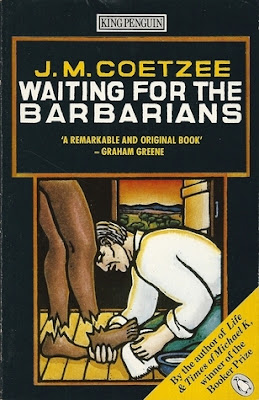 1980
1980
Reviewed by Marianne
from Let's Read
No names or places are mentioned in this novel. So, the story could take place in any corrupt country, in any dictatorship. Since the author is South African, I suppose that's where it takes place.
The description of the protagonist, the magistrate in a small post on the border of "the Empire" is very good. We see how he goes from thinking he is a loyal servant of a fair government to the discovery that the so-called barbarians are oppressed by the regime and those who think they are better than others for whatever reason.
As with so many novels that tell us about these situations, it is quite frightening to think how it is living in such a situation, where already your thoughts are a sin and nobody is supposed to know about it. And beware of helping others, especially if they are on the list of "enemies", "terrorists", "barbarians", whatever they are called in the respective countries.
This book might be more than fifty years old, but it's still as contemporary as ever. I can think of a few countries that are still in a similar situation, and I bet you can, as well.
We read this in our international online book club in January 2023.
Comments by other members:
I thought a lot about the namelessness of them/it all. I found it brutal, and abit difficult to read, as there was so much content in every word. I was not at all fond of the main character either, for being quite self-centered and lazy, (and a bit whiny) thinking one right corrects all wrongs and times he was the enabler.
I was left with questions such as "Why must empires expand?" "Why do empires such as this one pave the way for cruel and ambitious people into places of leadership?" "Where does suspicion come from?" I mean, attack first or else "the others" will attack us" or "cause pain to gain the real truth" or is it a calculated power-move, propaganda, guiding the narrative of the empire to keep expanding and keeping power central. "Who were really the barbarians?".
I enjoyed our discussion about the book a lot.
From the back cover:
"For decades the Magistrate has been a loyal servant of the Empire, running the affairs of a tiny frontier settlement and ignoring the impending war with the barbarians. When interrogation experts arrive, however, he witnesses the Empire's cruel and unjust treatment of prisoners of war. Jolted into sympathy for their victims, he commits a quixotic act of rebellion that brands him an enemy of the state. J. M. Coetzee's prize-winning novel is a startling allegory of the war between opressor and opressed. The Magistrate is not simply a man living through a crisis of conscience in an obscure place in remote times; his situation is that of all men living in unbearable complicity with regimes that ignore justice and decency."
J.M. Coetzee "who in innumerable guises portrays the surprising involvement of the outsider" received the Nobel Prize in 2003 and the Booker Prize for this novel in 1999.
Read my other reviews of the Nobel Prize winners for Literature.
Original Post on "Let's Read".




No comments
Post a Comment